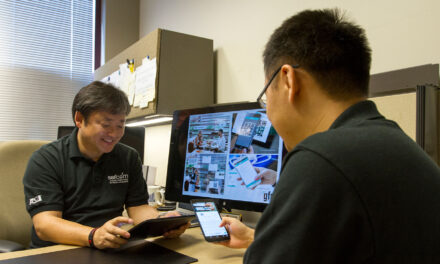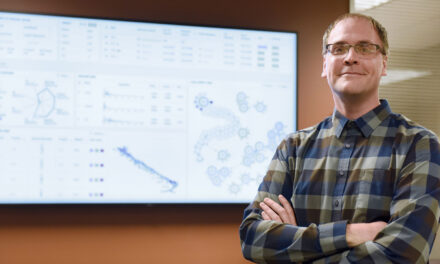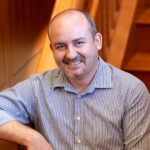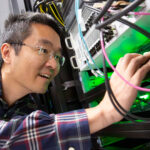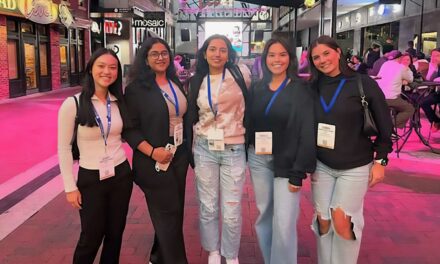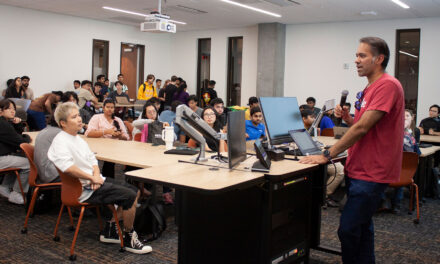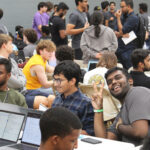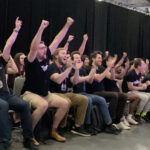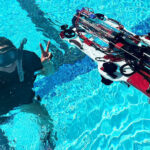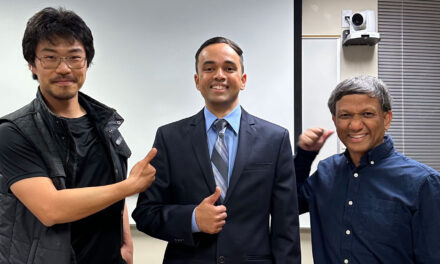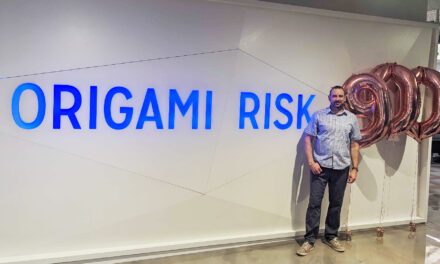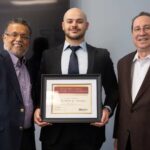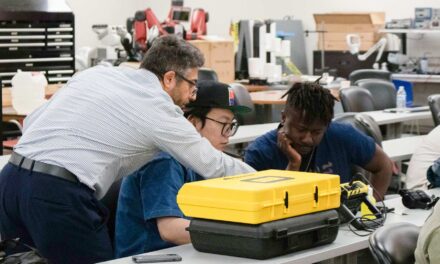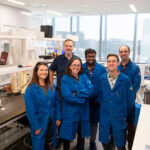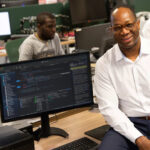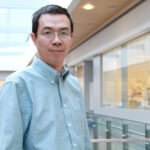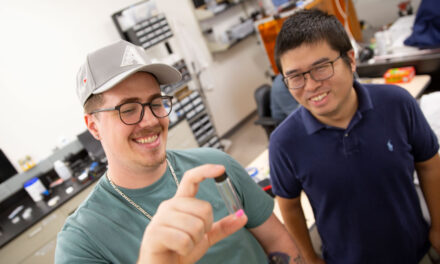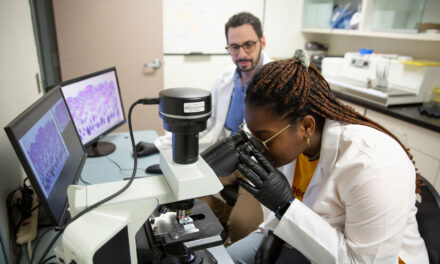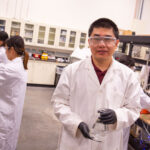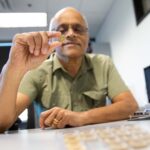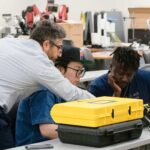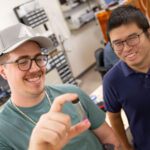
International experience empowers engineering students
NSF-supported collaborations with leading Irish university are boosting Fulton Schools students’ research prowess
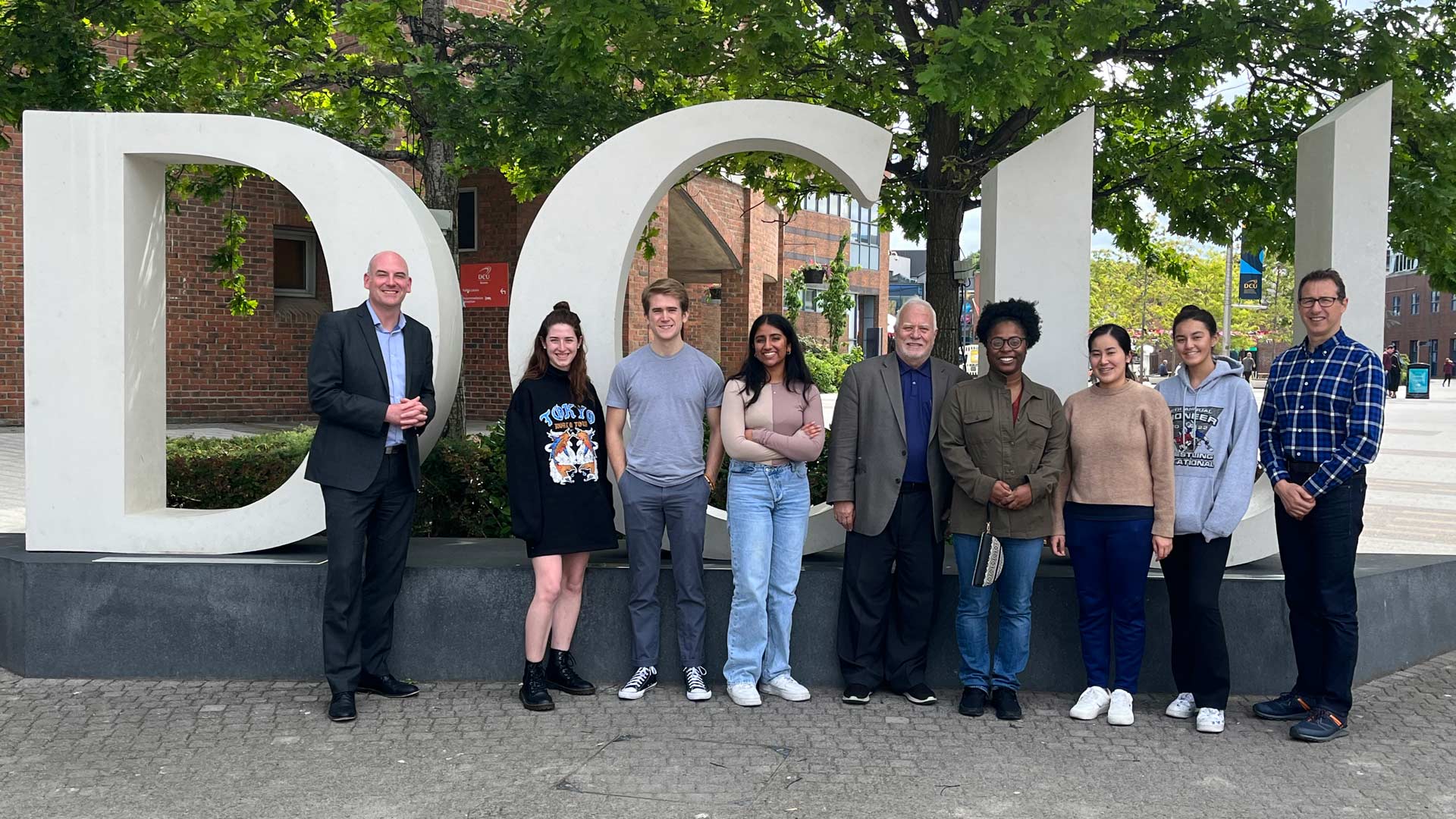
An old saying suggests a change of scenery will provide new perspectives on life. A current trend in higher education similarly encourages students to enhance their knowledge and skills through immersive and intensive hands-on learning in environments far from their familiar surroundings.
That alluring invitation is proving to entice students to the edifying opportunities offered by the International Research Experiences for Students , or IRES, program from the National Science Foundation.
IRES strives to bolster U.S. leadership in science and engineering research and education and strengthen the nation’s economic competitiveness by expanding training opportunities for the next generation of research leaders.
The program provides funding for U.S. undergraduate and graduate students to get in involved in international research, education and professional development experiences in fields of science and engineering critical to the country’s future.
Extraordinary research experiences
Students in the Ira A. Fulton Schools of Engineering at Arizona State University who participated in the six-week IRES sessions the past two summers attested to the benefits of collaborating with faculty researchers and fellow students abroad.
Participants say the variations in culture, history and social perspectives they’ve encountered have proven to be enlightening educational highlights.
Movinya Gunatilaka, a computer systems engineering student, was among six Fulton Schools students who went to Dublin City University, or DCU, in Ireland in 2022. The group was as part of the contingent led by the Sensor Signal and Information Processing, or SenSIP, Center, directed by Andreas Spanias, a professor of electrical engineering in the School of Electrical, Computer, and Energy Engineering, part of the Fulton Schools.
DCU, which also hosts Biodesign Europe, is a strategic international partner of ASU, and many students who participate in the program are affiliated with ASU’s Barrett, The Honors College.
The SenSIP IRES summer sessions have focused on machine learning and sensing devices, which made Gunatilaka skeptical about signing up.
“I had zero experience in those areas,” she says.
However, by the end of the session her concerns had given way to excitement.
“I absolutely loved it because of all the things it taught me,” Gunatilaka says. “Now, every week I’m talking to other students about IRES and trying to get them to sign up. It’s such a good experience for students to learn the fundamentals of machine learning and see what the world of research and academia is truly like.”
Through her work and the connections she made during her IRES activities last summer, Gunatilaka says she got valuable internship offer, while the IRES experience also prepared her for a summer experience this year, in Montreal, Canada, to investigate augmented reality at McGill University.
Fulton Schools chemical engineering student Asher Hendricks, whose interests include biosensors and wearable technologies like smartwatches, wanted to increase his knowledge of machine learning and artificial intelligence.
For his IRES project at DCU this past summer, he developed sensors to test iron levels in blood more rapidly and accurately, while also mentoring fellow Fulton Schools student Diwitha Rajmohan.
“I got a lot better at thinking of every possible variable that could impact my experiments,” Hendricks says. “My research, presentation and public speaking skills were definitely improved by this program because we constantly had to give reports to our mentors in Dublin and on Zoom to our mentors in the U.S. The research poster presentations we did also helped.”
While working with Hendricks, electrical engineering student Rajmohan learned to see how researchers in other places sometimes approach challenges differently than in the U.S.
“Working on another continent taught me about the work ethic of the people there and how they tackle research problems,” she says. “I had a wonderful experience collaborating with them. I made connections that I expect to lead to lasting friendships and working relationships.”
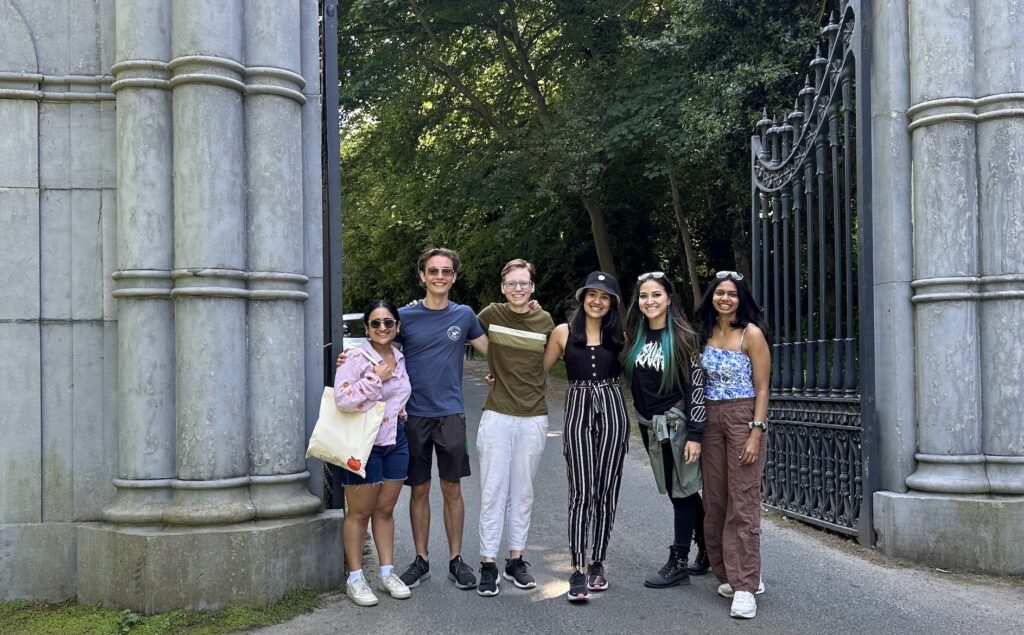
The 2023 cohort of Fulton Schools students who participated in the Ireland IRES program is pictured at the entrance to a castle on the outskirts of Dublin. The students (from left to right) are Dhrasti Dalal, Owen Krueger, Asher Hendricks, Avintha Doddipalli, Yumi Lamansky and Diwitha Rajmohan. Photo courtesy of Andreas Spanias
A solid foundation for a biomedical career
“It was the perfect opportunity for me,” says Anvitha Doddipalli,” a Fulton Schools biomedical engineering student minoring in data science, says of the IRES program. “I added the minor because I wanted to explore the applications of machine learning in the biomedical field.”
The IRES program involved biomedical sensor information processing and machine learning, combining much of what Doddipalli says she needs to pursue a research career.
“I completed two weeks of training in signal processing and machine learning, which gave me an amazing introduction to the field and a solid foundation to start working in it,” she says.
She also worked with mentors to process medical data from electroencephalogram, or EEG, tests, learned about DCU’s exoskeleton research program and presented a poster presentation about her work.
“Not only was the training educational, but the hands-on project reinforced the concepts and built up my interest in these areas, Doddipalli says. “It was also very exciting to see how research works in a different country and to network with faculty there.”
Opening options for the future
Fulton Schools biomedical engineering and ASU’s Barett, The Honors College undergraduate student Grace Billingsley, who participated in the Ireland IRES program in summer of 2022 and expects to graduate in May, was able to collaborate with students pursuing master’s and doctoral students degrees at DCU.
Billingsley says the work deepened her knowledge of medical advances through the development of machine learning algorithms and the use of MRI technology and computer programming to produce more accurate health and medical diagnoses than currently possible.
“The IRES program was a new learning experience for me,” Billingsley says. “None of it was anything I had any experience in, and now two years later I have a research journal publication on these topics. It’s been very useful and has opened a lot of doors to different options that I hadn’t thought about before as career paths after graduation.”
Chemical engineering doctoral student Ngan Anh Nguyen found collaborating with and learning from other Fulton Schools students and DCU faculty researchers through IRES especially valuable.
“Combining people’s areas of knowledge and technical skills was very important,” Nguyen says. “This teamwork led us to decide to write a paper on our project, and we plan to publish it at the end of the year.”
Her work in the program bolstered confidence in her decision to undertake more studies and research in sensor technologies with the aim of developing health care advances.
“Now I want to shape my education toward a career in medical device research,” Nguyen says.
Dhrasti Dalal, who is beginning studies in the Fulton Schools for a master’s degree in biomedical engineering, says she found the IRES program at DCU to be an enriching and relevant experience — especially because of the knowledge she gained in machine learning.
“When you look at job descriptions in my field, there are lot of them that require some machine learning skills,” Dalal says. “Now I can say that I have learned the basics of machine learning and have used it in a research project.”
Dalal says the program has helped to broaden her overall competence in engineering and related skills.
“I have more overall knowledge of the electronics, the mechanical components and the computing involved in biomedical engineering,” she says. “I feel like I can tackle a variety of different kinds of challenges.”
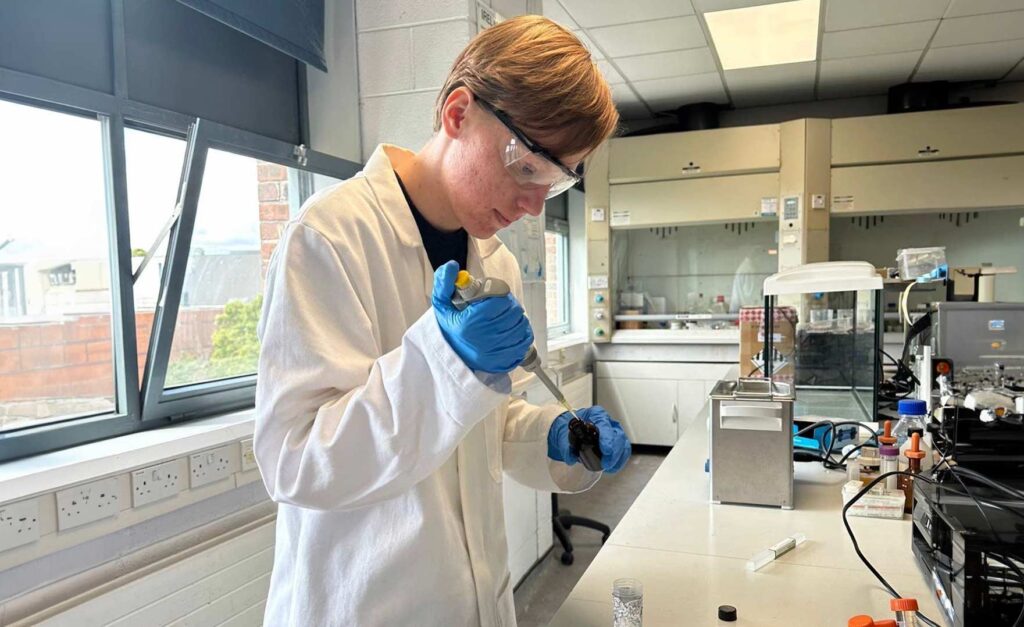
Asher Hendricks, a Fulton Schools chemical engineering student, conducted research in the Ireland IRES program that involved working with chemicals that react with iron to detect the presence of the metal in human blood. Photo courtesy of Asher Hendricks/ASU
Fostering an entrepreneurial spirit
Dalal’s statement encapsulates what the IRES program’s mission is all about, says Erica Forzani, deputy director of ASU’s Biodesign Institute Center for Bioelectronics and Biosensors and a professor of chemical engineering in the School for Engineering of Matter, Transport, and Energy, part of the Fulton Schools.
“This program is helping students go into the early stages of their careers with a working knowledge of artificial intelligence, machine learning, biometrics and advanced sensors, which are going to be a big part of the future of health care and many other aspects of life,” Forzani says. “I’m seeing these students come out of this experience with a sense of accomplishment and empowerment.”
“The main reason we chose to partner with DCU over many other alternatives is that it shares ASU’s entrepreneurial spirit,” says Gregory Raupp, a professor of chemical engineering in the School for Engineering of Matter, Transport and Energy and director of the Fulton Schools Ireland IRES program.
“We are highly aligned in our way of thinking about education, the role of universities and the importance of our research in getting new technological advances out into the world to serve society,” Raupp says. “We felt that our students will be getting a really good experience at DCU in a of mix of fundamental and applied research, while also getting exposure to how research is conducted in Europe.”
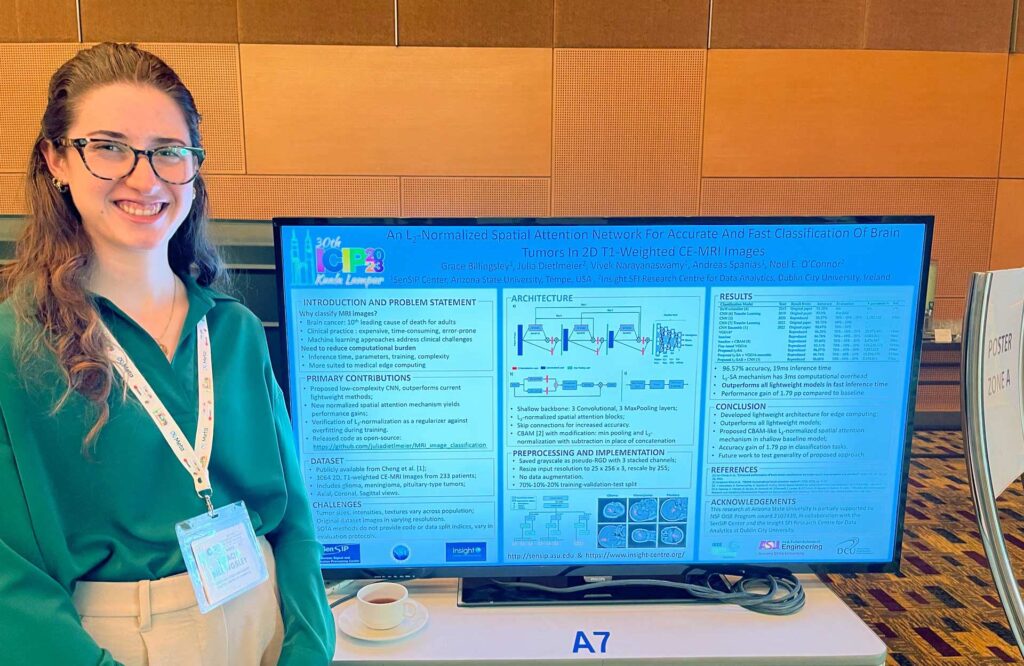
Fulton Schools biomedical engineering student Grace Billingsley’s Ireland IRES research project used machine learning technology to code an algorithm capable of identifying and diagnosing brain tumors from MRI images. The image is fed into the computer program, which will then identify if anything in the image that stands out as a potential tumor. Photo courtesy of Andreas Spanias/ASU
A promising evolving partnership
In addition to learning how to work in international academic and research environments, SenSIP Center Director Spanias says students who have participated in the program cite Ireland’s vibrant culture, the welcoming spirit of its people and the verdant, picturesque natural environment among their most treasured memories of the IRES program.
DCU leaders who helped Spanias and Raupp to establish the SenSIP Ireland IRES program include Noel O’Connor, a professor of electrical enginering and chief executive officer of DCU’s Insight Centre for Data Analytics , Tomas Ward, a professor of electrical engineering and director of the centre, and Nicholas Dunne, Biodesign Europe’s executive director.
In July of this year, the Insight Centre held a research poster event for the IRES project students.
“It was a pleasure to showcase the students’ remarkable research accomplishments during the insightful poster session,” Ward says. “Collaborative initiatives like these fuel innovation and foster meaningful exchanges that propel our institutions toward new frontiers.”
Julia Dietlmeier, a postdoctoral researcher in DCU’s Insight Centre involved in the IRS program, points to the educational experiences offered by by the IRES program as a big draw for students.
Dietlmeier emphasizes the importance of the opportunities for students to participate in research to address societal challenges through through experiments designed to produce high-impact research results. DCU’s accomplished research leaders assist and mentor students in their efforts.
Dietlmeier says the opportunities to participate in the production of poster presentations and in making videos for conferences strengthen the evolving strategic academic and research partnerships between ASU and DCU. She believes the activities also boost the benefits of the cultural exchange between the two countries.
More notable contributions
Among other significant outcomes of this year’s IRES session was a paper reporting on machine learning research conducted collaboratively by SenSIP and Insight Centre researchers and published in conjunction with the 2023 Institute of Electrical and Electronics Engineers, or IEEE, International Conference on Image Processing. The paper was written by Dietlmeier, Spanias, O’Connor, Fulton Schools doctoral student Vivek Narayanaswamy and Billingsley, who presented the paper at the conference in Kuala Lumpur, Malaysia.
Those who have also mentored students or otherwise participated in the ASU-DCU IRES program include Nadia Kellam, a Fulton Schools associate professor of engineering; Stephan Behan,a DCU assistant professor of elite human performance, Michael Scriney, a DCU assistant professor of computing; DCU Insight Centre researcher Margaret McCaul; DCU chemistry researcher Aoife Morrin, and DCU Insight Centre postdoctoral researchers Eni Kume and Una Britton.
Plans are now in the works for the Ireland IRES 2024 summer session, which will focus on sensor information processing and machine learning for wearable devices. Details and a link to the application form are on the SenSIP website.
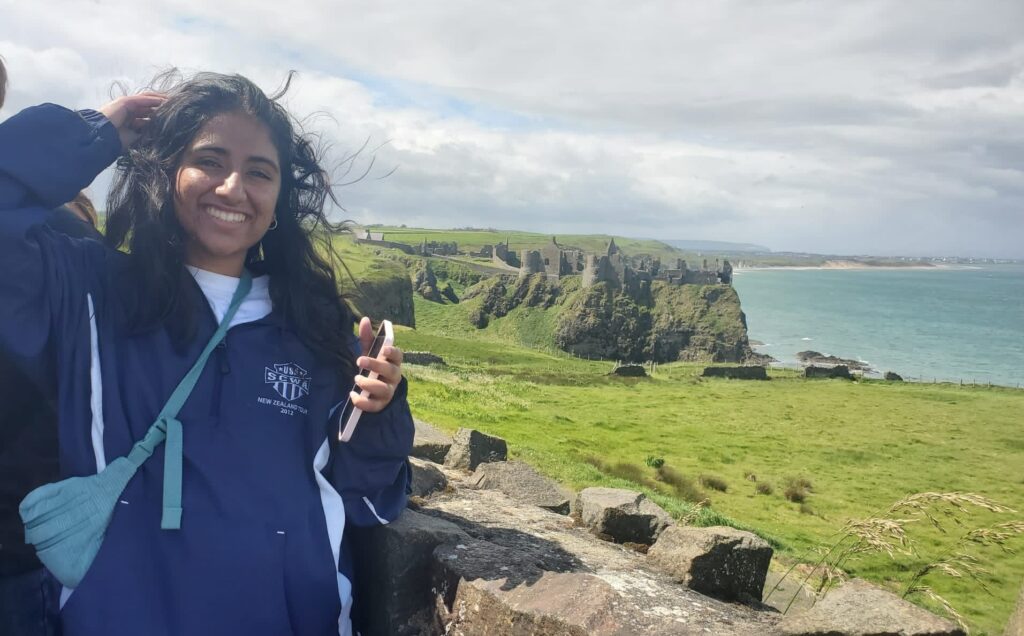
Students who have participated in ASU’s Sensor, Signal and Information Processing Center’s summer research experience excursions to Ireland say the country’s scenic landscapes are among the program’s memorable highlights. Fulton Schools student Movinya Gunatilaka is pictured during a bus tour of the Northern Ireland region, which included a stop at a location with a historic castle, seen here in the background. Photo courtesy of Monvinya Gunatilaka/ASU


